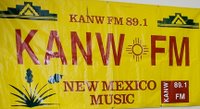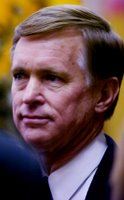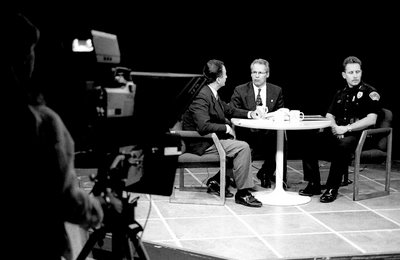 This is Michael Brasher taking the oath of office as a City Councillor, Dec. 1, 1997. His wife Jorja, a city employee in the Family and Community Services Department, holds the family Bible, while District Court Judge Theresa Baca administers the oath.
This is Michael Brasher taking the oath of office as a City Councillor, Dec. 1, 1997. His wife Jorja, a city employee in the Family and Community Services Department, holds the family Bible, while District Court Judge Theresa Baca administers the oath.Brasher represented District Nine on the City Council between 1989 and 2001. He failed to file his candidacy papers on time in 2001 and ran a write in campaign, but lost to Tina Cummins. In 1992, he was elected to the Bernalillo County Commission and reelected in 2006.
 Brasher is the manager of KANW FM 89.1, http://www.kanw.com/ that is owned and operated by the Albuquerque Public Schools. He has more than 25 years of broadcasting experience.
Brasher is the manager of KANW FM 89.1, http://www.kanw.com/ that is owned and operated by the Albuquerque Public Schools. He has more than 25 years of broadcasting experience.“You got it completely wrong,” Brasher said recently during a conversation. He was referring to my July 25, 2006 posting, “Mayor calling for conflict of interest reform???” In which I wrote:
“The city council has a long history of councillors working for other government agencies outside of the city while serving and voting on issues concerning conflicts of employers, family or personal interests without so much as publicly disclosing their connections during the particular debate.
This is not an exhaustive list, but during two terms, the 11th and 12th councils from 1994-97, Councillors Alan Armijo, Michael Brasher and Angela Robbins, were all employees of APS. Armijo lobbied for the schools at the state legislature. Brasher’s wife also worked for the city. Vince Griego worked for Bernalillo County and had several sons on the city’s payroll. Steve Gallegos was sergeant at arms for the state senate.
I always thought that such cross-governmental relationships were conflicts of interest.”
“I never voted for or even discussed issues that affected my wife, Jorja, or her Department,” Brasher said. “There were other councilors who wanted me to vote, but I didn’t.”
So what's wrong with this picture?
 If what I wrote upset Brasher, I apologize to him. His concern calls for some clarifications.
If what I wrote upset Brasher, I apologize to him. His concern calls for some clarifications. I spent a lot of time covering the City Council starting about 1991. During that time, I did not routinely cover the budget hearings, a committee of the whole, where each department’s budget would be scrutinized, discussed, debated and voted upon.
 I accept Brasher’s statement that he recused himself from those issues involving his wife’s department. I did however, observe Brasher vote on the entire budget that included the Family and Community Services’ budget. He also voted on APS issues.
I accept Brasher’s statement that he recused himself from those issues involving his wife’s department. I did however, observe Brasher vote on the entire budget that included the Family and Community Services’ budget. He also voted on APS issues. I don’t suggest that either of these facts are a violation of an ethical standard. I raised them for two reasons: to add to the discussion of what the ethical standards should be and what the potential problems are for a citizen council to address.
“Everybody has to work somewhere,” Brasher said,
I agree.
In my opinion, Brasher is one of the good guys. He made no secret of where he worked or who his wife was and what her employment was.
Disclosure is the first step in the ethical process and he met that head-on. The second is recusal from discussion and action where there might be an actual conflict or the appearance of conflict. For the most part, I think he passes that test also. My comments identified other councilors and I’m not so sure they were always as open.
He has supported a wide range of issues with which I agree, especially having to do with keeping citizens informed and involved in the government process.
 In Sept. 1995, Mayor Martin Chávez, seen here center with City Councillor Steve Gallegos, left and Chief of Police Joe Polisar, used his call in program “Mayor's Open Line” on GOV Cable 14 CCA-TV to encourage viewers to vote for an upcoming quarter cent Public Safety and Community Policing Tax.
In Sept. 1995, Mayor Martin Chávez, seen here center with City Councillor Steve Gallegos, left and Chief of Police Joe Polisar, used his call in program “Mayor's Open Line” on GOV Cable 14 CCA-TV to encourage viewers to vote for an upcoming quarter cent Public Safety and Community Policing Tax.The police union opposed the tax for several reasons. The cops believed they were being used to raise money by a special tax. They argued that police, along with other vital services, must always be funded. A special temporary tax increase was a cover for raising money in other areas.
Representing the union, I requested, “equal time” to have a discussion about the tax on GOV 14. I received no response and after the mayor aired the issue again, I went public by informing the press.
"Union member Mark Bralley watched from the control room and said he was frustrated because he felt union members should have been allowed on the city-operated Channel 14 to air their opinions on the tax just as the mayor has," was the quote in an Albuquerque Journal article by Guillermo Contreras and Steve Shoup headlined "City, Union Hit Airwaves To Debate Tax."
"The government-access channel is ours," said Deputy Chief Administrative Officer Jay Czar, in denying the union time to respond, according to the Albuquerque Tribune.
Brasher joined the fray. "Councillor berates city for denying TV access" headlined the Sept. 28, 1995, Albuquerque Tribune article by Ed Asher. "Mayor Martin Chavez's administration inappropriately denied the Albuquerque Police Officers' Association access to a government-run cable television station; City Councillor Michael Brasher says."
Brasher, in his role as councilor, requested time for a program of his own and organized a debate. The next day’s Albuquerque Journal Metro Watch notice said under the headline, "Cop's Union Gets TV Forum on Tax" announced that Brasher would host a call-in debate that night with members of the APOA and the Chamber of Commerce.
Brasher, hosted the GOV 14’s Open Line, a Government Cable Access program, discussing the quarter cent Public Safety and Community Policing Tax. Supporters were President of the Chamber of Commerce Robert McCabe, and President of Starlight Printing Rick Homans. Tax opponents from the APOA were, APOA Board member and Chicano Police Officers Association President Lieutenant Gilbert Najar and myself. The program provided a fair debate of the issues. The tax measure went down during the election.
 Commissioner Brasher is seen here, left, speaking as a private citizen, during the recent City Council discussion about the proposed downtown streetcar project that would to run along Central Avenue, with a spur to the Sunport, on Nov. 6, 2006. As a former City Councillor, he supported the original 1999 tax plan; he is holding an example of what a governmental project proposal looks like. He challenged the members of the council to delay passing an extension of the current quarter cent transportation infrastructure tax and called for an extensive study before proceeding.
Commissioner Brasher is seen here, left, speaking as a private citizen, during the recent City Council discussion about the proposed downtown streetcar project that would to run along Central Avenue, with a spur to the Sunport, on Nov. 6, 2006. As a former City Councillor, he supported the original 1999 tax plan; he is holding an example of what a governmental project proposal looks like. He challenged the members of the council to delay passing an extension of the current quarter cent transportation infrastructure tax and called for an extensive study before proceeding.Through his management at KANW and as an elected official, Brasher has maintained vigilance in keeping government open, honest and accessible to the public.
No comments:
Post a Comment